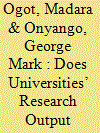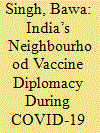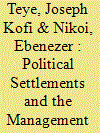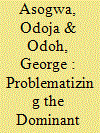|
|
|
Sort Order |
|
|
|
Items / Page
|
|
|
|
|
|
|
| Srl | Item |
| 1 |
ID:
193024


|
|
|
|
|
| Summary/Abstract |
The Republic of Korea Government implemented a universal consumption subsidy program to combat the coronavirus disease 2019 (COVID-19) economic downturn in 2020. Using granular, micro-level transaction data, we find that the subsidy scheme has stimulated household consumption immediately after receipt. Moreover, lower income groups demonstrate higher marginal propensity to consume than middle and higher income groups; this holds true even when creating synthetic control groups that model rational spending behavior. This can have a significant implication on the effectiveness of fiscal impulse. Using income and average historical credit card spending, we also demonstrate credit and liquidity constraints are major factors affecting consumption responses.
|
|
|
|
|
|
|
|
|
|
|
|
|
|
|
|
| 2 |
ID:
193026


|
|
|
|
|
| Summary/Abstract |
Few studies on developing countries have investigated the alignment of research output to a country’s development agenda and economic productivity. Using evidence from Kenya, this study sought to empirically determine whether the country’s research output is aligned to its development agenda in the first instance and to establish the output’s relationship to economic productivity. Journal publications were used to measure research output. From the analysis, 86% of the publications fell within one or more of the national development priority areas, though 60% were in only 6 of the 35 areas. Several areas had no publications at all during the period under investigation. Furthermore, excluding the health and education sectors, a strong positive relationship was established between the number of publications in different priority areas and those areas’ contribution to Gross Domestic Product. The Government, therefore, needs to avail research funding to research institutions, which, in turn, need to focus their research effort on all identified national development priority areas if Kenya’s development aspirations are to be achieved and the desired economic growth attained.
|
|
|
|
|
|
|
|
|
|
|
|
|
|
|
|
| 3 |
ID:
193021


|
|
|
|
|
| Summary/Abstract |
This study tests the effect of fake news awareness as an intervention strategy for motivating news verification behaviour among social media users in Nigeria. A quasi-experiment was utilized with 470 participants divided into two groups, comprising the control group, n = 235, and the treatment group, n = 235. Fake news awareness was found to be an effective intervention strategy used to intensify the urgency and need to verify news before sharing. Individuals exposed to fake news awareness campaigns reported a more positive attitude towards news verification, better self-efficacy towards verification and were more concerned about their reputation on social media.
|
|
|
|
|
|
|
|
|
|
|
|
|
|
|
|
| 4 |
ID:
193022


|
|
|
|
|
| Summary/Abstract |
The president of Tunisia, Kais Saied, recurred to Article 80 of the constitution on 25 July 2021 to proclaim the “state of exception,” freezing parliamentary activities, removing the representatives’ immunity, and dissolving the government headed by Prime Minister Hichem Mechichi. The following presidential decree 2021-117 on 22 September granted him legislative powers by decree, dismantling the constitution of 2014, which was the cornerstone of the result of the “Jasmine Revolution” of 2011. This article will analyze the constitutionality of the presidential decrees and shed light on the juridical, socioeconomical, and political circumstances that allowed Saied to perform what can be described as a constitutional coup or a self-coup, which reshaped the future of Tunisia.
|
|
|
|
|
|
|
|
|
|
|
|
|
|
|
|
| 5 |
ID:
193027


|
|
|
|
|
| Summary/Abstract |
In recent years, India has established itself as the world’s ‘pharmacy hub’, and this claim was proven once again when it delivered COVID-19 vaccines to its citizens, neighbouring nations and across the globe. Following the philosophy of humanitarianism through the principle of ‘Vasudhaiva Kutumbakam’, India has decided to provide the COVID-19 health assistance to its immediate neighbouring countries. India’s immediate neighbourhood refers to the countries that are geographically adjacent to it. In addition, India’s vaccine diplomacy has exposed geopolitical fault lines in South Asia as China’s vaccine diplomacy aims to outpace India in the region. Against this background, the main objective of this paper is to explain and examine India’s vaccine diplomacy as an instrument of its ‘Neighbourhood First’ policy during the COVID-19 pandemic. It argues that India’s health-focused approach has proved effective and aligned with its national interests. This review demonstrates that India’s health diplomacy has had an impact on medical and humanitarian assistance reciprocation at the regional and international levels. As a result of this strategy, during the second wave of the pandemic, India received medical devices and vaccines from other countries in dealing with COVID-19.
|
|
|
|
|
|
|
|
|
|
|
|
|
|
|
|
| 6 |
ID:
193018


|
|
|
|
|
| Summary/Abstract |
This article explored a new approach to football fandom by Liverpool F.C. supporters club in Nsukka, Nigeria. Between 2019 and 2020, this group embarked on thanksgiving ceremonies to commemorate the successes of Liverpool F.C. within that period. The study adopted participant observation and oral interviews as methods of data collection. Findings show that the reason for the thanksgiving ceremonies by the group is anchored on a tenacious faith in God, who can do all things, including helping Liverpool F.C. win trophies. This finding brings to scholarly attention the much-neglected role the Christian faith plays in football fandom among young people in Nsukka, Nigeria.
|
|
|
|
|
|
|
|
|
|
|
|
|
|
|
|
| 7 |
ID:
193025


|
|
|
|
|
| Summary/Abstract |
Based on the intersection of primary and secondary sources, this article seeks to take stock of the position taken by the Italian Left, and in particular by the Italian Communist Party as regards Ben Bella’s authoritarianism (1962–1965). This position is taken into consideration regarding the so-called ‘1962 summer crisis’, the repressive measures against opposition groups and the 19 June 1965 coup d’état. This article argues that Partito Comunista Italiano (PCI) and partially Italian Left maintained an unconditional support for Ben Bella during his presidency. The relationship with Front de Libération Nationale was blindly defended and continued despite everything and everyone.
|
|
|
|
|
|
|
|
|
|
|
|
|
|
|
|
| 8 |
ID:
193019


|
|
|
|
|
| Summary/Abstract |
This paper relies on literature review and primary data collected through in-depth interviews with 21 respondents to examine the political economy dynamics of the cocoa value chain in Ghana. The historical analysis, which was based on the political settlements framework, has shown that the policies implemented in the cocoa sector went through four periods. The colonial era was characterised by a fairly corporate governance system and struggle between European traders and farmer cooperatives for monopoly over internal marketing of cocoa. This was followed by the early post-independence era (1957–1980), which was characterised by neopatrimonialism and over-taxation of cocoa farmers. The third phase (1980–2000) witnessed economic reforms and liberalisation. The fourth phase (2000 to present) saw increased public–private partnerships aimed at empowering women and promoting environmentally friendly farming activities. The paper concludes that the policies in the cocoa sector have, historically, created more benefits (rents) to political elite and their crony capitalists. Given that rent-seeking behaviour is a threat to the sustainability of the cocoa sector, the paper urges international development partners and civil society groups to demand greater accountability and transparency from the political elite and state institutions in the cocoa sector.
|
|
|
|
|
|
|
|
|
|
|
|
|
|
|
|
| 9 |
ID:
193020


|
|
|
|
|
| Summary/Abstract |
Oil has played a determinant role in the economic development of Sudan and South Sudan before and after their separation. The introduction of oil into the Sudanese economy in 1999 has been associated with many challenges, especially those related to export diversification, and institutional quality. Oil dependency increased with the growth of oil share in total exports. Therefore, the secession of South Sudan in 2011 represents a great shock to both economies. This event creates a situation in which the new country experienced a sudden influx of oil revenues. At the same time, the parent country witnessed a sudden loss of 70% of its proven oil reserves. This makes the case of Sudan unique and provides a very rare opportunity for macroeconomists to address the impacts of this shock on both economies. This paper uses the recent secondary data of both counties to analyze and compare the impact of oil revenues transfer on Sudan and South Sudan’s economies in the post-secession period. The conclusion of this paper shows that oil loss has created incentives for better economic performance in Sudan. Reciprocally, South Sudan experiences a premature oil dependence that led to export concentration, institutional degradation, and macroeconomic instability.
|
|
|
|
|
|
|
|
|
|
|
|
|
|
|
|
| 10 |
ID:
193023


|
|
|
|
|
| Summary/Abstract |
This study examines how the lives of three women, Lọlọ Ọyịodo Eze Elugwu, Lọlọ Ọyịma Ezema, and Lọlọ Ọyima Ayọgụ from Nsukka Igbo, southeast Nigeria, challenge widespread assumptions on women’s involvement in Igbo masking traditions. Although the uncommon achievements of these women do not completely dismantle existing beliefs and assumptions that view Igbo masquerade activities as the exclusive preserve of men, the study highlights how their roles as initiates of the Omabe masquerade cult, as well as their capacities to commission, own and animate masks, problematize notions of gender, power and spaces in Igbo masquerade institution. It equally opens up a critical space for interrogating women’s positions and roles in Igbo masquerade institution and establishes grounds for re-appraising its essence and gendering politics.
|
|
|
|
|
|
|
|
|
|
|
|
|
|
|
|
| 11 |
ID:
193028


|
|
|
|
|
| Summary/Abstract |
Globally, the proliferation of informal settlements continues unabated, challenging us to understand life in these risk-prone urban ‘hotspots’. Although women and children are vulnerable to risks in these marginalised environments, young men are more often considered generators of risk while their own susceptibilities are disregarded. Addressing this oversight, this study, undertaken in informal areas of Cape Town, South Africa, using a range of qualitative methods, investigated the vulnerabilities of young Xhosa men. The findings reveal conflicted masculine identities, shaped by the complex environments young men encounter in navigating life on the margins. Demonstrating the tensions shaping their identities and behaviour, the nature of their vulnerabilities is shown to be constructed over time in response to the changing landscapes young men encounter. It also reveals how they develop individualised defence mechanisms and coping strategies to survive in these environments, contesting the hegemonic forms of masculinity they are more often labelled with.
|
|
|
|
|
|
|
|
|
|
|
|
|
|
|
|
|
|
|
|
|